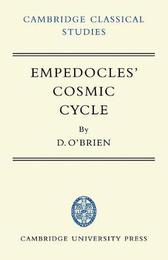
|
Empedocles' Cosmic Cycle: A Reconstruction from the Fragments and Secondary Sources
Paperback / softback
Main Details
| Title |
Empedocles' Cosmic Cycle: A Reconstruction from the Fragments and Secondary Sources
|
| Authors and Contributors |
By (author) Denis O'Brien
|
| Series | Cambridge Classical Studies |
|---|
| Physical Properties |
| Format:Paperback / softback | | Pages:476 | | Dimensions(mm): Height 216,Width 140 |
|
| Category/Genre | Literary studies - classical, early and medieval
Western philosophy - Ancient to c 500 |
|---|
| ISBN/Barcode |
9780521100373
|
| Classifications | Dewey:182.5 182.5 |
|---|
| Audience | | Undergraduate | | Postgraduate, Research & Scholarly | |
|---|
| Illustrations |
Worked examples or Exercises
|
|
Publishing Details |
| Publisher |
Cambridge University Press
|
| Imprint |
Cambridge University Press
|
| Publication Date |
18 January 2009 |
| Publication Country |
United Kingdom
|
Description
The cosmic cycle described in the surviving fragments of Empedocles' poem is the alternation, in endless succession, of Love and Strife. Love is the cause of happiness and unity; Strife the cause of separation and misery. These forces rule in turn as they cause the One and the Many. Love makes the elements into a blissful whole, the Sphere; Strife breaks into the Sphere and causes movement and division - the condition of the world, according to Empedocles, in which we now live. Dr O'Brien's book is primarily an analysis of this elaborate system. It seeks to determine the positions which Love and Strife occupy in the world at different times, the processes involved in becoming one and becoming many and the duration of being one and being many. It examines such associated themes as Empedocles' view of the nature of the soul and his use of the traditional motif 'like to like'. Finally, Dr O'Brien considers Empedocles; place in the subsequent development of Greek philosophy. He sees Empedocles' work as a primitive anticipation of Plato, a significant union of spiritual other-worldliness with the philosophical and scientific traditions of the Presocratics.
|